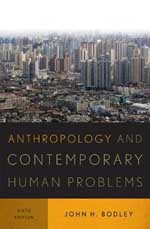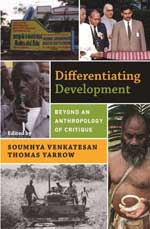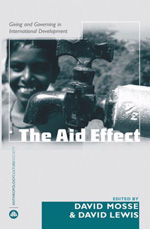
Development refers to the strategies which aim to transfer resources and assistance from the world's economically richer nations to poorer nations. This transfer can occur either directly (known as bilateral aid - eg the UK government's Department for International Development) or indirectly (known as multilateral aid - eg the UN's various agencies like the Food and Agriculture Organisation). Development is a somewhat unhappy notion because it implies improvement, which is not always the experience of those subjected to economic development programmes. Anthropologists have demonstrated how technological and economic innovations invariably bring other changes in their train, which may not be perceived by all those caught up in them, in the short-term at least, as desirable or in their interests. Distressing social consequences of development can more than cancel out any material benefits. The disturbance and bewilderment experienced by people when changes proceed swiftly have been well documented by anthropologists.
The realisation that development programmes have been responsible for undesirable and unsustainable change, often involving a considerable waste of resources, has promoted a fundamental re-think of the very idea of development. Previously, governments and international agencies imposed interventions on the so-called ignorant poor who were thought to demand modernisation. Economists, technocrats and policymakers dominated this process and anthropology had scarcely any meaningful part to play other than as critic of the sometimes devastating consequences. The field of applied anthropology was marginal to the carrying out of these programmes. Today, development agencies are increasingly interested in facilitating initiatives which promote the participation of the poor and, with the assistance of anthropologists, are paying closer attention to indigenous systems of knowledge and understanding. Non-government organisations have played a prominent part in promoting this grass-roots perspective. It is a perspective which offers anthropology a central role in development practice.
Text written by Professor Paul Sillitoe
Postgraduate programmes in the UK
![]() University College London
University College London
![]() School of Oriental and African Studies
School of Oriental and African Studies
Recommended Resources
Film
The following trailer is for The Godess and the Computer, a film distributed by the Royal Anthropological Institute.
 THE GODDESS AND THE COMPUTER
THE GODDESS AND THE COMPUTER
Directors André Singer and Steven Lansing
Location Indonesia
Released 1989
Length 80 minutes
This film, made for Channel Four Television's Fragile Earth series, follows two American irrigation scientists who are seeking to understand the ancient Balinese irrigation system and forestall further environmental problems. Using traditional methods of cultivation, a single plot of irrigated land can produce tons of rice, year after year, century after century, with no added fertilizer and no ecological degradation. To understand why, biologist Jim Kremer, takes us into the paddies with laboratory tools, showing how the rice pond becomes a miniature aquatic ecosystem which produces abundant energy for the plants, and how "development" can threaten this careful balance.
The Royal Anthropological Institute (RAI) has one of the largest ethnographic film libraries in Europe. Films are available for hire, sale, or loan for educational and academic purposes. Click here for a list of films the RAI distirbutes on Anthropology of Development.
General
https://r4d.org/ - an open access portal containing information about research programmes supported by the DFID.
http://www.cultureandpublicaction.org – a forum to foster dialogue across disciplines on issues related to culture and development.
http://www.kiwanja.net – an organisation which aims to combine techonology, anthropology, conservation and development.
Books



Anthropology and Contemporary Human Problems 6th Edition
Bodley, H.J. (AltaMira Press, 2012)
Differentiating Development : Beyond an Anthropology of Critique
Venkatesan,S. and Yarrow,T.(Eds.) (Berghahn Books,2012)
The Aid Effect: Giving and governing in International Development
Mosse, D and D. Lewis (Eds.) (Pluto Press, 2005)
Articles & Online Journals
https://helda.helsinki.fi/handle/10138/165717 - a working paper from the Institute of Development Studies, University of Helinski on the Cultural process of Development.
Radio
Visit our Anthropology on the Radio webpage for radio programmes on Anthropology of Development.
Professional Organisations, Groups & Associations
Department for International Development -DFID is the part of the UK government that manages Britain's aid to developing countries and works to eliminate extreme poverty.
Global Poverty Research Group-The GPRG is an Economic and Social Research Council (ESRC) funded multi-disciplinary programme of work investigating issues of poverty, inequality and the quality of life.
Overseas Development Institute - ODI is Britain's leading independent think tank on international development and humanitarian issues.
Disclaimer: The above information is provided for information and guidance only. It should not be interpreted as endorsement or otherwise by the Royal Anthropological Institute (RAI) for any external institution listed. Furthermore, the RAI accepts no responsibility for material created by external parties or the content of external websites.
